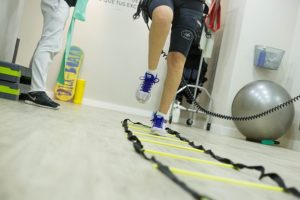Multiple Sclerosis is a complex disease; those living with it need a simple approach. A treatment approach should appreciate the physiology of the disease process without neglecting the human body as a holistic system, and the patient as a person.
Naturopathy is an ideal philosophy of medicine for the treatment of M.S. as it aims to address disease processes and symptoms without loosing sight of the patient as an individual.
I chose to focus in neurological disease early into my professional career and as a result I have come across many complex chronic diseases of the nervous system including all subtypes of M.S. When patients come for their initial visit it is not uncommon to be privy to a long list of life events that have impacted the disease, symptoms that have evolved over years and medications that have been tried, stopped and tried again.
It’s easy to see why the practitioner on the other end of the patient with M.S. can become overwhelmed and confused, loosing sight of the big picture, dismissing the patients needs and goals. Unfortunately, this medical tunnel vision re-aimed at addressing each and every concern translates into complex and confusing treatment plans that most patients cannot comply with. I sympathize with these patients who have to remember to take dozens of pills while also dealing with a life altering condition.
To make matters worse, these confusing treatment plans hardly ever work because they tend to forget that the human body is not a series of islands, rather it’s a society striving to work in harmony and balance. The key to developing a simple, understandable and effective treatment plan is to figure out what is out of balance and how do we bring it back.
A typical treatment plan for M.S. has three parts: Foundations, The Immune System and Specific Symptoms. Since we are working toward bringing the body back into balance it is important to take the time to hear the full story and timeline of how the condition started and progressed. Often during the initial consultation it will become clear as to what type of events precluded the first attack and how these events triggered a physiological imbalance.
Foundations
It’s a futile effort to try and treat symptoms while the very basics of health and wellness are not fortified. The foundations of health can be summed up into three parts: Sleep, Diet and Exercise.
Sleep is the healing chamber for the body. Recently studies have shown that the brain undergoes a type of detoxification process while we sleep. Many neurodegenerative diseases have been correlated to poor sleeping habits. It is common to see sleeping issues in patients with M.S. In fact I have had a few cases where years of terrible sleep may have contributed to the patient experiencing their first symptoms related to M.S. This makes sense in the light of the new research demonstrating how important sleep is in clearing neurotoxic compounds from the brain.
One of the most important protocols I put together for my M.S. patients is aimed at improving sleep. This is achieved through sleep hygiene education and supplements that have been carefully vetted over my years in practices for their effectiveness in improving sleep initiation and maintenance.
Diet is important for a number of reasons, some are general and some are specific to M.S. The food we eat and its relation to our digestive tract determines our nutritional robustness.
M.S. is a chronic neuro-inflammatory state and therefore patients with M.S. will be using up vitamins and minerals involved in inflammatory processes at a greater rate than in a healthy control group. Therefor it’s important to determine what the nutritional status is of the M.S. patient (through consultation and specific lab tests), bring it back into balance and correct deficiencies. Otherwise the body will be unable to cope with the inflammatory process and the disease will progress.
It is also important to identify any food allergens, intolerances and sensitivities in the M.S. patient for these will perpetuate the inflammation. Chronic inflammation has a detrimental effect on the immune system, which I will discuss further in the next part of the treatment plan.
Another aspect related to diet is the health of the gastrointestinal tract and more specifically the micro-biome (the bacteria of the gut). A healthy micro-biome is important for detoxification, nutrient absorption and immune system regulation. A protocol addressing diet will focus on testing for nutritional deficiencies, food sensitivities, specific dietary guidelines for M.S. and supportive supplements where necessary.
A good dietary resource specific to M.S. is The Wahls Protocol.
 Exercise is a powerful health modulator and is under-appreciated for its importance in chronic disease and specifically M.S. Often exercise comes in the form of physiotherapy in progressive M.S. and the first thing I will do with a patient is set them up with one of the physiotherapists in my clinic (if they don’t already have a physiotherapy program). Often patients newly diagnosed with M.S. are neglected by the medical system in terms of exercise. In-patient rehab programs are inadequate, scooters and wheelchairs are promoted over therapy. Exercise and physiotherapy are instrumental in promoting neuroplasticity, decreasing inflammation, improving energy metabolism, maintaining and improving upon range of motion.
Exercise is a powerful health modulator and is under-appreciated for its importance in chronic disease and specifically M.S. Often exercise comes in the form of physiotherapy in progressive M.S. and the first thing I will do with a patient is set them up with one of the physiotherapists in my clinic (if they don’t already have a physiotherapy program). Often patients newly diagnosed with M.S. are neglected by the medical system in terms of exercise. In-patient rehab programs are inadequate, scooters and wheelchairs are promoted over therapy. Exercise and physiotherapy are instrumental in promoting neuroplasticity, decreasing inflammation, improving energy metabolism, maintaining and improving upon range of motion.
My clinic specializes in neurological rehabilitation using the Bobath Physiotherapy approach. Physio-Logic
The Immune System
Multiple Sclerosis is an autoimmune condition and therefore one cannot overlook the role of the immune system. Autoimmunity basically translates to a confused immune system that has targeted healthy cells and tissues rather than disease. The philosophy behind this part of the treatment plan addresses two questions: how the immune system became confused and how to bring it back into harmony.
There are many theories as to the cause of M.S., to name a few: Genetics, Vitamin D deficiency, Environmental Toxin Exposure, Candida Overgrowth, Dairy Protein Antigen Confusion and Leaky Gut Syndrome. There are truths to be told within many of these theories but in reality we just don’t know exactly what causes M.S. Some things we do know are the triggers for symptom activation, and things that reduce the risk of developing M.S. We know that stress (physical and/or emotional) often precipitate symptom relapse and progression. We also know that having adequate vitamin D levels are protective toward the development of M.S.
 Vitamin D is not longer thought of as merely a bone-building vitamin. In reality it is more of a hormone and has a very important role in maintaining the health of the immune system. Step one of addressing the immune system is making sure the patient has optimal levels of vitamin D and if not, to adjust those levels using specific supplemental doses of vitamin D along with calcium and regular follow-up blood work.
Vitamin D is not longer thought of as merely a bone-building vitamin. In reality it is more of a hormone and has a very important role in maintaining the health of the immune system. Step one of addressing the immune system is making sure the patient has optimal levels of vitamin D and if not, to adjust those levels using specific supplemental doses of vitamin D along with calcium and regular follow-up blood work.
Stress, whether it physical or emotional, causes a burden on the body. Most of the time we are able to cope with short durations of stress; however, when the stressful event is severe enough or lasts long enough it can impact the immune system in a negative way. Chronic stress can affect the immune system in two ways: Creating chronic inflammation that harms tissues and suppressing immune cells needed to fight infection.
When the immune system is under prolonged stress it becomes tired and makes mistakes, much like how we feel when under stress. One of these possible mistakes is mounting an autoimmune attack, harming normal healthy tissue rather than disease. Prolonged stress also depletes natural anti-inflammatory compounds like cortisol, allowing inflammation to run amuck. Therefore the protocol built around the immune system is aimed at decreasing stress on the immune system and bringing the immune system back into balance.
Anything that can be causing unnecessary inflammation needs to be dealt with and therefore chronic infections and food sensitivities must be addressed. Specific lab testing is used to investigate infections and sensitivities. Common food sensitivities in M.S. patients include: Dairy, Gluten, Yeast and Egg.
Once the major obstacles to a healthy immune system are removed we can work toward assisting the immune system back into a balanced state. The most important cells involved in bringing the immune system back into balance are “regulatory T cells” also known as “T suppressor cells”. These cells maintain tolerance in the immune system preventing autoimmunity. Part of the protocol is therefore aimed at supporting these cells. Some compounds that influence regulatory T cells are: probiotics, vitamin D, vitamin A, Omega 3 fatty acids and food sensitivities.
Specific Symptoms
Treating foundations and immune system irregularities take time, therefore it is almost equally important to address the specific symptoms of the patient. Fatigue, weakness and pain are often obstacles to important foundational concerns like sleep and exercise.
Fortunately, there are many great strategies within Naturopathic medicine to help address the most common symptoms in M.S. namely: Weakness, Spasticity, Fatigue, Pain, Bowel and Bladder issues. There are dozens of supplements that have shown promise in treating the common symptoms of M.S. The art of the practitioner is in choosing the right compounds for the right patient. As an example, medical marijuana can be very effective for spasticity, pain, bladder dysfunction and sleep but can exacerbate weakness. A good practitioner with experience in treating M.S. will know how to choose the appropriate medications for the patients needs.
Multiple Sclerosis is a complex condition with many subtypes and many different ways it affects the individual patient. Naturopathic medicine aims to treat the root cause of disease while also addressing the individual concerns of the patient. The treatment plan can be summed up into three areas: Foundations, Immune System and Specific Symptoms. This helps direct the practitioner toward the right approach and simplifies the philosophy behind the treatment, improving upon compliance and therefore patient outcomes.
[button size=”btn-large” link=”https://doctorshawn.ca/contact-us/” target=”_blank” ]Call us today![/button]











